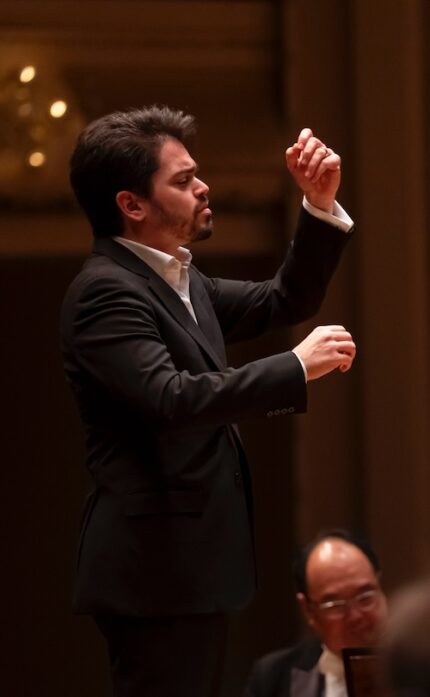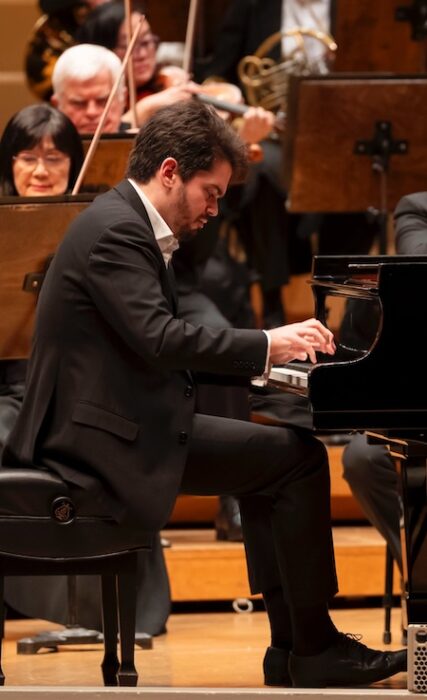Shani channels Barenboim in CSO’s uneven 2024 finale

Spacious tempi, rounded textures, a conductor-soloist leading from the keyboard—these ubiquitous elements of Daniel Barenboim’s tenure as music director of the Chicago Symphony (1991-2006) were back in spades as his protégé Lahav Shani took the orchestra’s reins Thursday night to close the year at Orchestra Hall.
Music director of the Israel Philharmonic and Rotterdam Philharmonic Orchestras, the 35-year-old Shani left mixed impressions in his previous stands with the CSO, and such was the case again Thursday.
The performance began with Beethoven’s Overture to Egmont, and one could hear the influence of Shani’s mentor in the slow introduction’s blurry attacks. The Israeli conductor smoothed over much of the overture’s angularity, compromising its air of brooding tension, which was further undermined by a fitful lack of ensemble between winds and strings. The concluding pivot to major brought some belated intensity, but this was largely gritless Beethoven.
Shani himself was the soloist in Shostakovich’s Piano Concerto No. 2, which, remarkably, had not been heard downtown since the Solti era. Shostakovich was 50 when he wrote the concerto for his teenage son Maxim, and a youthful esprit runs through the work, particularly its antic outer movements.

Todd Rosenberg
The piano plays more or less constantly, so Shani led by example in what was in effect conductorless chamber music. He brought power to the bounding octaves of the opening Allegro, and had full command of its technical acrobatics, but there is more bite to be had here, with the cadenza feeling particularly flat.
Shani was at his finest in the central Andante, an expressive nocturne in the spirit of Chopin, where he mined the hushed poetry of Shostakovich’s writing with supple support from the CSO strings. The closing Allegro was again largely direct. The flurries of scales wink at Hannon agility exercises, but Shani’s rendition channeled these literally without much madcap wit, though the incisive orchestral backdrop provided some welcome personality.
Having brought largely Russian Romantic repertoire for his previous CSO programs, Shani closed in a solidly Germanic vein with Brahms’ Symphony No. 1 in C Minor. He did not heed the “poco” of the first movement’s “Un poco sostenuto” indication, rounding Brahms’ textures to the point of sonic soup. The movement’s main Allegro felt somehow motionless despite the storminess of Brahms’ writing, with Shani seeming to react to the music as much as shaping it, quite like his Tchaikovsky Pathétique last June. A larger vision is called for in Brahms’ broad canvas.
Shani’s somewhat passive approach fared better in the central movements. Beautifully singing solos from oboist William Welter highlighted the Andante sostenuto, and were matched in refinement by his woodwind colleagues as the movement unfolded. Concertmaster Robert Chen provided graceful filigree in the closing bars, clearly recovered from an overuse injury that sidelined him for two months earlier this season.
Principal clarinet Stephen Williamson elegantly launched the Un poco allegretto e grazioso, and Shani brought nobility to the central 6/8 episode in B Major, though the ending failed to gel under his ambiguous, baton-free direction.
The ominous atmosphere of the final movement’s Adagio came across, though ultimately built to an indifferent horn solo from principal Mark Almond, who gave a disappointingly flat treatment to what can be one of the most stirring moments in the repertoire. The indelible theme of the Allegro non troppo went with regal poise, and Shani drew some late fireworks in the movement’s propulsive episodes, but again seemed largely reactive, resulting in a Brahms that was less than the sum of its parts.
The program will be repeated 1:30 p.m. Friday and 7:30 p.m. Saturday. cso.org
Posted in Performances



Posted Dec 26, 2024 at 10:21 pm by Jaime Herrera
Wow. You didn’t pull any punches. Nice.